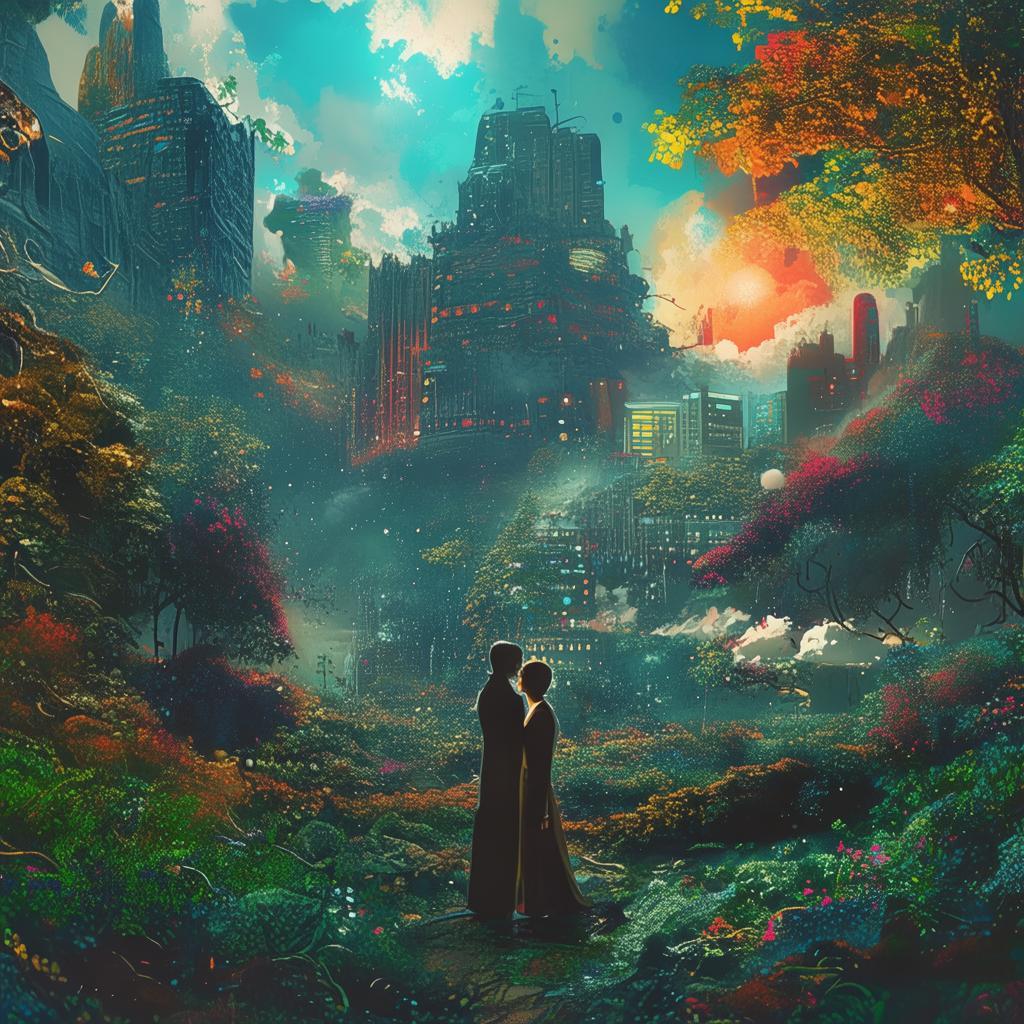Whispers of the Forbidden Palace
In the heart of the Forbidden City, where the emerald walls whispered tales of the past, there lived a young woman named Qing Hua. She was the daughter of the grand minister, a position of great power and influence under the rule of the Qing Dynasty. Qing Hua was known for her beauty, grace, and intelligence, but her heart harbored a forbidden love—a love that could cost her everything.
The object of Qing Hua's affection was none other than the Emperor's son, a young man named Ming. Ming was a prince of the blood, destined for greatness, yet he was also a man of passion and a soul that longed for something beyond the confines of his royal duties. Their love was as forbidden as the night air that seeped through the palace's ancient windows, a love that dared to challenge the very fabric of the dynasty.
One fateful evening, as the moon hung low and the palace gardens were shrouded in shadows, Qing Hua and Ming met in secret. Their words were hushed, their touch electric. But as the stars above them twinkled in silent witness, a guard approached, and their love was discovered.
The emperor, a man known for his stern rule and unforgiving nature, was incensed. He banished Ming to a distant province, a punishment that would keep them apart forever. Qing Hua, in her heartbroken state, sought a way to reunite with her beloved. She knew that the only hope lay in the ancient secrets of the Forbidden City, a place where the boundaries between the mortal and the mythical were blurred.
In her quest, Qing Hua discovered an ancient scroll, a relic of the Yellow Emperor, that held the key to her salvation. The scroll spoke of a hidden chamber beneath the palace, a place where the spirits of the ancestors resided and where wishes could be granted. With the scroll in hand, Qing Hua set out to find the chamber, a journey that would take her through the labyrinthine corridors of the Forbidden City.
As she ventured deeper into the palace, Qing Hua encountered spirits and apparitions, each with their own story and connection to the dynasty's past. Among them was the spirit of a concubine who had once loved the same prince, Ming. The concubine's spirit, though vengeful, offered Qing Hua a piece of wisdom: "The heart that seeks love will find a way, even if it must cross the path of the mythical."
With newfound determination, Qing Hua reached the hidden chamber, a place where the air was thick with the scent of incense and the echoes of ancient voices. There, she made a wish, not for herself, but for Ming's return. As she spoke her wish, the chamber was bathed in a blinding light, and the spirits of the ancestors seemed to listen.
When Qing Hua opened her eyes, she found herself in the middle of a storm, with Ming at her side. The prince, who had been held captive by the emperor's orders, had been transported to this place by the magic of the ancient scroll. Together, they made their way back to the Forbidden City, where Qing Hua faced the emperor and the council of ministers.
The emperor, moved by Qing Hua's unwavering love and the magic of the scroll, decided to forgive Ming and allow their love to flourish. But the story did not end there. Qing Hua and Ming, now united, faced a new challenge—the balance between their love and the fate of the Qing Dynasty.

As the years passed, Qing Hua and Ming's love story became a legend, a tale of the Forbidden City that would be whispered for generations. Their love, once forbidden, had become a beacon of hope, a reminder that even in the most rigid of societies, love could find a way to break through the barriers of tradition and destiny.
In the heart of the Forbidden City, where the emerald walls whispered tales of the past, there lived a young woman named Qing Hua. She was the daughter of the grand minister, a position of great power and influence under the rule of the Qing Dynasty. Qing Hua was known for her beauty, grace, and intelligence, but her heart harbored a forbidden love—a love that could cost her everything.
The object of Qing Hua's affection was none other than the Emperor's son, a young man named Ming. Ming was a prince of the blood, destined for greatness, yet he was also a man of passion and a soul that longed for something beyond the confines of his royal duties. Their love was as forbidden as the night air that seeped through the palace's ancient windows, a love that dared to challenge the very fabric of the dynasty.
One fateful evening, as the moon hung low and the palace gardens were shrouded in shadows, Qing Hua and Ming met in secret. Their words were hushed, their touch electric. But as the stars above them twinkled in silent witness, a guard approached, and their love was discovered.
The emperor, a man known for his stern rule and unforgiving nature, was incensed. He banished Ming to a distant province, a punishment that would keep them apart forever. Qing Hua, in her heartbroken state, sought a way to reunite with her beloved. She knew that the only hope lay in the ancient secrets of the Forbidden City, a place where the boundaries between the mortal and the mythical were blurred.
In her quest, Qing Hua discovered an ancient scroll, a relic of the Yellow Emperor, that held the key to her salvation. The scroll spoke of a hidden chamber beneath the palace, a place where the spirits of the ancestors resided and where wishes could be granted. With the scroll in hand, Qing Hua set out to find the chamber, a journey that would take her through the labyrinthine corridors of the Forbidden City.
As she ventured deeper into the palace, Qing Hua encountered spirits and apparitions, each with their own story and connection to the dynasty's past. Among them was the spirit of a concubine who had once loved the same prince, Ming. The concubine's spirit, though vengeful, offered Qing Hua a piece of wisdom: "The heart that seeks love will find a way, even if it must cross the path of the mythical."
With newfound determination, Qing Hua reached the hidden chamber, a place where the air was thick with the scent of incense and the echoes of ancient voices. There, she made a wish, not for herself, but for Ming's return. As she spoke her wish, the chamber was bathed in a blinding light, and the spirits of the ancestors seemed to listen.
When Qing Hua opened her eyes, she found herself in the middle of a storm, with Ming at her side. The prince, who had been held captive by the emperor's orders, had been transported to this place by the magic of the ancient scroll. Together, they made their way back to the Forbidden City, where Qing Hua faced the emperor and the council of ministers.
The emperor, moved by Qing Hua's unwavering love and the magic of the scroll, decided to forgive Ming and allow their love to flourish. But the story did not end there. Qing Hua and Ming, now united, faced a new challenge—the balance between their love and the fate of the Qing Dynasty.
As the years passed, Qing Hua and Ming's love story became a legend, a tale of the Forbidden City that would be whispered for generations. Their love, once forbidden, had become a beacon of hope, a reminder that even in the most rigid of societies, love could find a way to break through the barriers of tradition and destiny.
✨ Original Statement ✨
All articles published on this website (including but not limited to text, images, videos, and other content) are original or authorized for reposting and are protected by relevant laws. Without the explicit written permission of this website, no individual or organization may copy, modify, repost, or use the content for commercial purposes.
If you need to quote or cooperate, please contact this site for authorization. We reserve the right to pursue legal responsibility for any unauthorized use.
Hereby declared.









